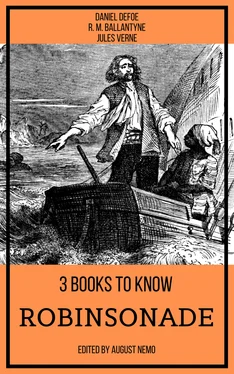I knew not now what to say, for although I felt sure that that word was for him as well as for me, I could not remember any other word whereby I could prove it.
After a short pause, Bill raised his eyes to mine and said, “Ralph, I’ve led a terrible life. I’ve been a sailor since I was a boy, and I’ve gone from bad to worse ever since I left my father’s roof. I’ve been a pirate three years now. It is true I did not choose the trade, but I was inveigled aboard this schooner and kept here by force till I became reckless and at last joined them. Since that time my hand has been steeped in human blood again and again. Your young heart would grow cold if I— But why should I go on? ’Tis of no use, Ralph; my doom is fixed.”
“Bill,” said I, “‘Though your sins be red like crimson, they shall be white as snow.’ Only believe.”
“Only believe!” cried Bill, starting up on his elbow. “I’ve heard men talk o’ believing as if it was easy. Ha! ’tis easy enough for a man to point to a rope and say, ‘I believe that would bear my weight;’ but ’tis another thing for a man to catch hold o’ that rope and swing himself by it over the edge of a precipice!”
The energy with which he said this, and the action with which it was accompanied, were too much for Bill. He sank back with a deep groan. As if the very elements sympathised with this man’s sufferings, a low moan came sweeping over the sea.
“Hist, Ralph!” said Bill, opening his eyes; “there’s a squall coming, lad! Look alive, boy! Clew up the foresail! Drop the mainsail peak! Them squalls come quick sometimes.”
I had already started to my feet, and saw that a heavy squall was indeed bearing down on us. It had hitherto escaped my notice, owing to my being so much engrossed by our conversation. I instantly did as Bill desired, for the schooner was lying motionless on the glassy sea. I observed with some satisfaction that the squall was bearing down on the larboard bow, so that it would strike the vessel in the position in which she would be best able to stand the shock. Having done my best to shorten sail, I returned aft, and took my stand at the helm.
“Now, boy,” said Bill in a faint voice, “keep her close to the wind.”
A few seconds afterwards he said, “Ralph, let me hear those two texts again.”
I repeated them.
“Are ye sure, lad, ye saw them in the Bible?”
“Quite sure,” I replied.
Almost before the words had left my lips the wind burst upon us, and the spray dashed over our decks. For a time the schooner stood it bravely, and sprang forward against the rising sea like a war-horse. Meanwhile clouds darkened the sky, and the sea began to rise in huge billows. There was still too much sail on the schooner, and as the gale increased, I feared that the masts would be torn out of her or carried away, while the wind whistled and shrieked through the strained rigging. Suddenly the wind shifted a point, a heavy sea struck us on the bow, and the schooner was almost laid on her beam-ends, so that I could scarcely keep my legs. At the same moment Bill lost his hold of the belaying-pin which had served to steady him, and he slid with stunning violence against the skylight. As he lay on the deck close beside me, I could see that the shock had rendered him insensible; but I did not dare to quit the tiller for an instant, as it required all my faculties, bodily and mental, to manage the schooner. For an hour the blast drove us along, while, owing to the sharpness of the vessel’s bow and the press of canvas, she dashed through the waves instead of breasting over them, thereby drenching the decks with water fore and aft. At the end of that time the squall passed away, and left us rocking on the bosom of the agitated sea.
My first care, the instant I could quit the helm, was to raise Bill from the deck and place him on the couch. I then ran below for the brandy-bottle, and rubbed his face and hands with it, and endeavoured to pour a little down his throat. But my efforts, although I continued them long and assiduously, were of no avail; as I let go the hand which I had been chafing, it fell heavily on the deck. I laid my hand over his heart, and sat for some time quite motionless; but there was no flutter there — the pirate was dead!
ALONE ON THE DEEP — Necessity the Mother of Invention — A Valuable Book Discovered — Natural Phenomenon — A Bright Day in My History.

IT WAS WITH FEELINGS of awe, not unmingled with fear, that I now seated myself on the cabin skylight and gazed upon the rigid features of my late comrade, while my mind wandered over his past history and contemplated with anxiety my present position. Alone in the midst of the wide Pacific, having a most imperfect knowledge of navigation, and in a schooner requiring at least eight men as her proper crew! But I will not tax the reader’s patience with a minute detail of my feelings and doings during the first few days that followed the death of my companion. I will merely mention that I tied a cannon-ball to his feet, and with feelings of the deepest sorrow, consigned him to the deep.
For fully a week after that a steady breeze blew from the east, and as my course lay west and by north, I made rapid progress towards my destination. I could not take an observation, which I very much regretted, as the captain’s quadrant was in the cabin; but from the day of setting sail from the island of the savages I had kept a dead reckoning, and as I knew pretty well now how much leeway the schooner made, I hoped to hit the Coral Island without much difficulty. In this I was the more confident that I knew its position on the chart — which, I understood, was a very good one — and so had its correct bearings by compass.
As the weather seemed now quite settled and fine, and as I had got into the trade-winds, I set about preparations for hoisting the topsails. This was a most arduous task, and my first attempts were complete failures, owing, in a great degree, to my reprehensible ignorance of mechanical forces. The first error I made was in applying my apparatus of blocks and pulleys to a rope which was too weak, so that the very first heave I made broke it in two, and sent me staggering against the after-hatch, over which I tripped, and striking against the main-boom, tumbled down the companion-ladder into the cabin. I was much bruised and somewhat stunned by this untoward accident. However, I considered it fortunate that I was not killed. In my next attempt I made sure of not coming by a similar accident, so I unreeved the tackling and fitted up larger blocks and ropes. But although the principle on which I acted was quiet correct, the machinery was now so massive and heavy that the mere friction and stiffness of the thick cordage prevented me from moving it at all. Afterwards, however, I came to proportion things more correctly; but I could not avoid reflecting at the time how much better it would have been had I learned all this from observation and study, instead of waiting till I was forced to acquire it through the painful and tedious lessons of experience.
After the tackling was prepared and in good working order, it took me the greater part of a day to hoist the main topsail. As I could not steer and work at this at the same time, I lashed the helm in such a position that, with a little watching now and then, it kept the schooner in her proper course. By this means I was enabled, also, to go about the deck and down below for things that I wanted as occasion required; also to cook and eat my victuals. But I did not dare to trust to this plan during the three hours of rest that I allowed myself at night, as the wind might have shifted, in which case I should have been blown far out of my course ere I awoke. I was, therefore, in the habit of heaving-to during those three hours — that is, fixing the rudder and the sails in such a position as that, by acting against each other, they would keep the ship stationary. After my night’s rest, therefore, I had only to make allowance for the leeway she had made, and so resume my course.
Читать дальше













